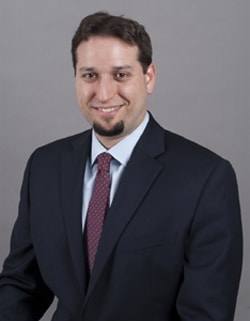November is Pancreatic Cancer Awareness Month: Should I get Screened?

November is Pancreatic Cancer Awareness Month, and what better time is there to discuss screening for Pancreatic Cancer? Around 53,000 people are expected to be diagnosed in the USA this year, with about 43,000 expected deaths from Pancreatic Cancer. We have not quite made the same progress with Pancreatic Cancer as we have with Colon and Rectal cancers, but trying to identify those individuals that may benefit from screening and early intervention remains a strong focus for many doctors today.
As is the case with many cancers including Breast Cancer, prevention and early detection are key. This would include screening programs for healthy individuals, as well as highlighting those patients who may be at elevated risk for development of the cancers, either due to a personal or family history of the cancer, or a genetic predisposition.
A problem we encounter with pancreatic cancer is that there are no guidelines for screening healthy patients like we have for breast or colon cancer. In 2016 the US Preventive Services Task Force concluded that there is not enough data to support national screening for all individuals. However, patients at elevated risk may benefit from screening strategies as outlined in multiple research studies. In particular, patients with a family history of pancreatic cancer or a genetic syndrome, of which BRCA positivity is one of those syndromes noted, would benefit from a screening strategy.
Pancreatic Cancer risks in our Breast Cancer patients in general are difficult to assess. There is no strong data to support a link between Breast and Pancreatic cancers, outside of specific genetic syndromes. For BRCA1 and BRCA2 carriers, the estimated lifetime risk of pancreatic cancer development is ~1% for BRCA1 carriers, which is similar to the general population, but is significantly elevated to ~5% for BRCA2 carriers. Based on these statistics, there are some doctors who advocate for screening BRCA2 carriers given the high lifetime risk.
Screening includes:
checking a blood test for a tumor marker called CA 19-9
MRI of the pancreas
And/or Endoscopic Ultrasound (an Endoscopy that uses internal ultrasound)
When to begin screening is an evolving topic. A recent study advocates for screening in general to begin at age 50, and to continue every three years unless otherwise warranted by the exam findings. I do counsel my patients with a family history of pancreatic cancer to consider earlier screening at least 10 years earlier than that age at which their relative was diagnosed. Although there is no consensus guideline at this time, this has become one of the reasonable screening strategies.
The goal of screening is to identify and treat early cancers, or find early changes that may be intervened upon before cancer even develops. We want to identify those early cancers that can be surgically removed and cured, because late stage diagnosis is difficult to treat and is associated with poorer outcomes.
In summary, for patients with a family history of pancreatic cancer or BRCA mutations, strategies exist for Pancreatic Cancer screening, and I would encourage those patients to speak with their genetic counselors or gastroenterologists. In this fashion we hope to identify those patients with early abnormalities, or those individuals which may benefit from more aggressive monitoring in order to win the fight against pancreatic cancer.
Stuart Akerman, MD is a gastroenterologist in Dallas-Fort Worth, TX and is a member of Digestive Health Associates of Texas, PA. He treats patients for many gastroenterology conditions, and has a strong clinical interest in cancer screening and prevention. You can learn more about Dr. Akerman and his practice on his website http://www.stuartakermanmd.com
References:
https://seer.cancer.gov/statfacts/
Ferrone CR, Levine DA, Tang LH, Allen PJ, Jarnagin W, Brennan MF, Offit K, Robson ME. BRCA germline mutations in Jewish patients with pancreatic adenocarcinoma. J Clin Oncol. 2009;27(3):433.
Das KK, Early D. Pancreatic Cancer Screening.Curr Treat Options Gastroenterol. 2017 Sep 6.
Bartsch DK, Slater EP, Carrato A, eta l. Refinement of screening for familial pancreatic cancer.
Gut. 2016 Aug;65(8):1314-21.
DISCLAIMER
THE VIEWS EXPRESSED ON THE BLOG ARE THOSE OF THE INDIVIDUAL USERS AND NOT NECESSARILY THE VIEWS OF SHARSHERET. ALTHOUGH SHARSHERET WILL BE MODERATING ALL MESSAGES POSTED TO THE BLOG, WE DO NOT CONFIRM OR WARRANT THE USEFULNESS, ACCURACY, OR COMPLETENESS OF ANY MESSAGES AND ARE NOT RESPONSIBLE FOR ANY DAMAGE OR LOSS RELATED TO THE ACCURACY OR COMPLETENESS OF THE INFORMATION. SHARSHERET DOES NOT MAKE ANY EXPRESSED OR IMPLIED WARRANTIES WITH REGARD TO INFORMATION OF MERCHANTABILITY, FITNESS FOR A PARTICULAR PURPOSE, OR WARRANTIES OF TITLE OR NON-INFRINGEMENT. IN NO EVENT SHALL THE PROVIDERS BE LIABLE TO YOU OR A THIRD PARTY FOR ANY ACTION, OR FAILURE TO ACT BASED ON RELIANCE ON THE CONTENT POSTED ON THE BLOG. ALL INFORMATION IS PROVIDED WITHOUT ANY WARRANTY OF ANY KIND.
